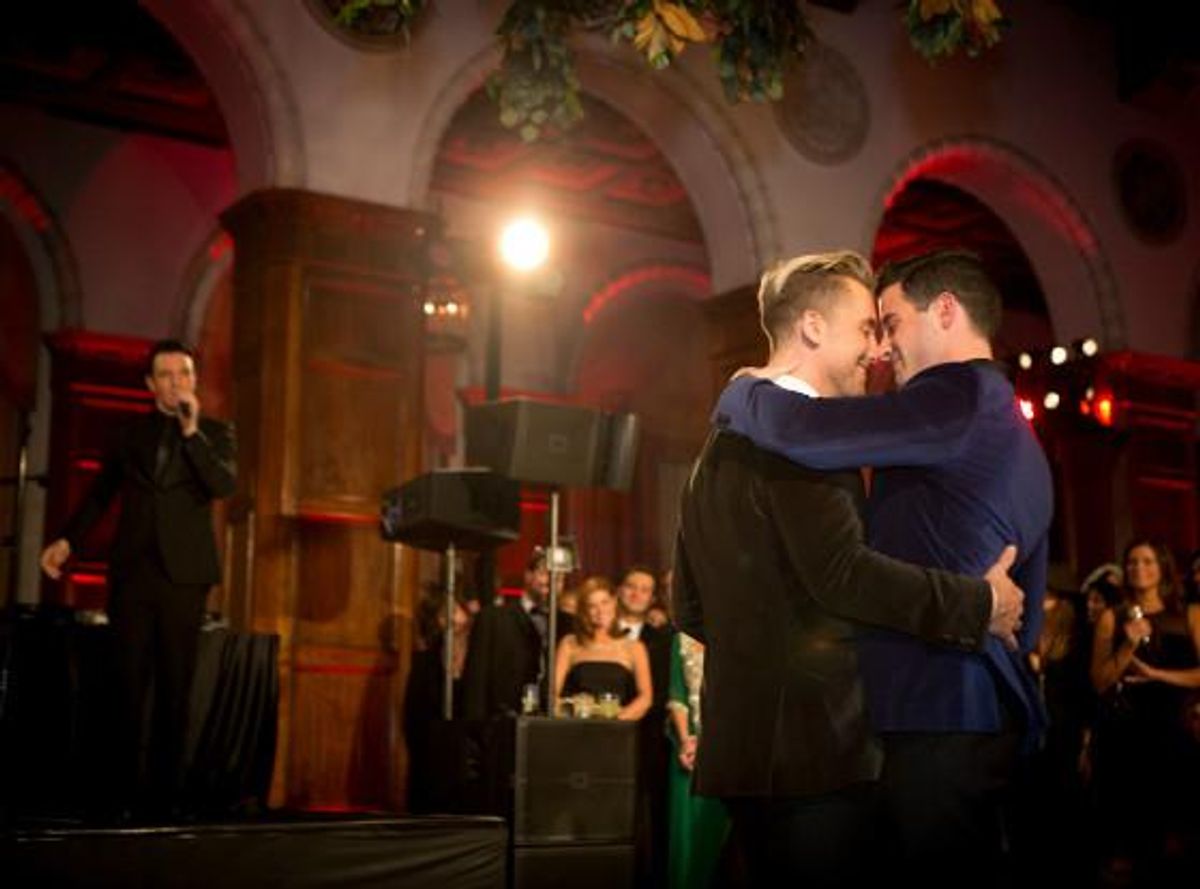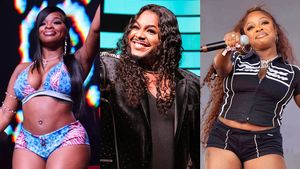Michael Segal Photography
Mercifully, there was only one joke about which man would be wearing the dress in last Thursday's E! Television special that followed the wedding preparations of former N'Sync star Lance Bass and his fiance Michael Turchin. That is still one joke too many, but otherwise the crude innuendoes were refreshingly absent. Absent, too, was the drama--unusually so for a channel that specializes in tantrums and tears. There were mild tensions over the wedding cake, and a momentary panic over who might replace celebrity model Kendall Jenner as a flower girl, but the most radical thing about the Bass-Turchin wedding--the first same-sex nuptials to be televised in America--was just how unradical it all seemed.
Watching the two young men as they selected their wedding registry, it was hard to imagine anyone feeling threatened by these quotidian scenes of domestic fussing and fretting. And yet, until a few years ago, Bass and Turchin couldn't even marry in California, where they live. Bass still can't marry in Mississippi, where he comes from, but the dwindling number of states that still prohibit same-sex marriage feel less like a threat than an anomaly.
SLIDESHOW | LANCE BASS & MICHAEL TURCHIN WEDDING
Whether you found it absurd and tacky, or sweet and charming, or both, Lance Loves Michael: The Lance Bass Wedding was a potent reminder of how quickly the ground has shifted. In 2000, when then-Governor of Vermont Howard Deen signed the nation's first civil unions bill into law, the backlash was so fierce that he had to wear a bulletproof vest. By contrast, a Gallup poll last year showed that almost 80 percent of those aged between 18 and 29 now support same-sex marriage. This is, after all, a generation that has grown up with gay and lesbian people on television, from MTV's The Real World to HBO's Looking, the San Francisco-based comedy that divides gay audiences into those who relish having a mirror held up to their peccadilloes, and those who do not.
Straight people have enjoyed the privilege of being able to choose the lens through which they see their lives for half a century or more. For gay men and lesbians having our identities presented in complex and nuanced ways is still a novel experience. The success of shows like Orange is the New Black on Netflix, and Transparent, an extraordinary leap of faith by Amazon, signals that better visibility for transgender characters may not be far behind. Figures compiled by GLAAD show LGBT visibility on an upward trajectory: of scripted shows on the five broadcasting networks in the 2012-13 season, some 4.4 percent of regular characters were LGBT. Of those, 30 percent were people of color.
These numbers may seem small, but they represent a golden age for anyone who can recall the barren landscape of the 80s and 90s, when gay characters served as little more than punch lines, if at all. In 1995, Roseanne Barr dared to build an episode of her mould-breaking sitcom around a gay wedding, a concept so risque for the era that ABC pushed the scheduled airtime back 90 minutes because of its "adult humor."
It's hard to conceive now, but until fairly recently gay was routinely conflated with sex, as if our identity was simply a matter of what we do in bed. When I started editing Out in 2006, it wasn't uncommon to find the magazine shelved in the pornographic section of bookstores and newsstands, a potent metaphor for how the gay community was viewed in general: X-rated, shameful, and excluded from polite company.
ULTIMATE GAY TV TIMELINE
It's true that televised weddings of rich and famous gays can stick in the craw of those who never did aspire to polite company, let alone those who still find themselves marginalized, but as Bass pointed out in explaining the decision to televise his wedding, "as a little kid from Mississippi, if I would have seen a gay wedding on TV, I would have been, like, 'Oh, well, there's nothing wrong with me. I don't have to pray to God to change me to straight." That, too, sticks in the craw of those who find their once-reliable specters of brimstone and fire no longer have the same effect. Television has seen to that.
Chris Rock, in a recent profile in New York magazine, aptly described Ellen DeGeneres as the Rosa Parks of the LGBT movement. He wasn't being facetious. It was DeGeneres's decision to come out, first in person, in 1997, on the Oprah Winfrey Show, and then in character, in 1998, with a now-famous kiss on her sitcom, Ellen, that helped to get us on the bus. Shortly after that, a duo of TV shows--Will & Grace, the long-running NBC sitcom about a gay man and his straight girlfriend, and Queer as Folk, a British series remade (and relocated, to Pittsburgh) by Showtime--proved that high ratings and gay characters were not mutually exclusive. It's true that we barely (ever?) saw Will, or his cartoonish sidekick, Jack, so much as kiss another man, but like ABC's Modern Family, or Fox's Glee, the show served to narrow the cultural distance between gay people and everyone else. Simultaneously, in an increasingly transparent culture, more and more closeted actors began finding their moment to come out.
As it turned out, the most striking moment in Lance Loves Michael was not the wedding, but a blink-and-you-would-miss-it kiss the two men share at a shower thrown by Bass's sister in her Mississippi home. Afterwards Bass confesses how awkward he felt sharing that brief intimate moment in front of his grandparents, who have never seen him kiss another man. It was a reminder, even after all this time, of how a very ordinary experience is still capable of feeling transformative for gay men, lesbians and transgender people who learned to censor such expressions in adolescence. All these years after Ellen's earth-shaking kiss, it's still the simplest expression of love that feels the most profound.
























































































